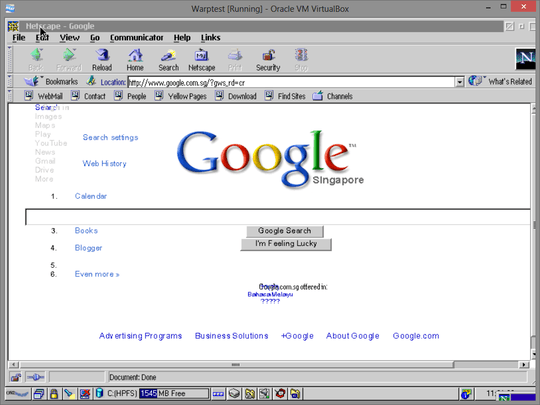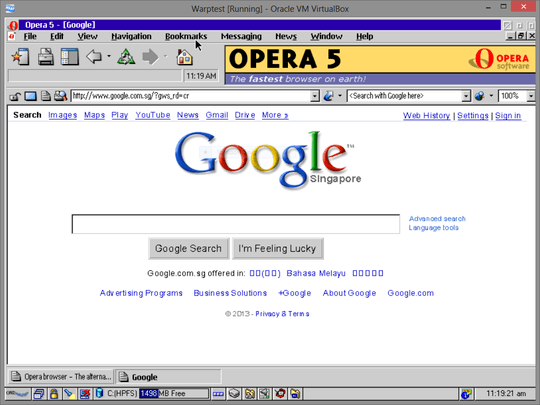56
1
The reason for this question is that many times clients, friends and parents ask me why their perfectly working old PC cannot be used online anymore. I am looking for a good answer to those people and myself (mostly myself).
In 2000 I worked on a Pentium2 400MHz PC and I remember surfing graphically rich sites, watching RealPlayer embedded videos and enjoying Flash movies.
Yesterday I fired up that old pc and went online - the PC slowed down to a crawl on most sites I tried to open.
The sites I was viewing just had images, text and one or two flash banners - just like most sites in 2000.
So what has changed? Browsers? JavaScript? Flash?
Here are my theories - correct me where I'm wrong:
Heavy JS usage. In the 90's you clicked on a link and that took you to another URL. Now clicking you get modal windows, sliders, social voting, etc. JS is known to be heavy on the CPU, even if the browser does some on-the-fly compiling it sill has to be done by the CPU.
The way browsers are made Browser engines are getting more reusable. Well done abstraction layers allow the same engine to be used on PC's and devices. Abstraction takes a toll on the CPU, because the engine is not made specifically for that hardware architecture.
Flash, HTML5 video Many Flash banners have rich animations and many times they are ineffectively made. Flash video and HTML5 video nowadays requires you to have a modern GPU.
Modern CPU architectures Today I work on a 3GHz CPU. Technically that should be around 6x times faster than my P2 400MHz. Actually it is even faster because modern CPU's do not work the same as my P2. We cannot compare the MHz values anymore because of multiple cores and other new technologies. That is the reason we are now talking about architectures (like Haswell) rather than GHz values. So, since the CPU so much faster it can easily handle jQuery, Google maps and flash video on the same page.


1New versions of .NET frameworks have been released. And now days there would be much more client side processing than in 2000! – None – 2013-08-05T15:03:28.873
Do other programs fine of them? Old computers are old. – Zirak – 2013-08-05T15:06:16.833
More client side processing - I agree. Don't know though why you mentioned .NET?
And yes running new apps on the old PC is impossible. I guess I miss the SNES style direct memory programming methods which made possible amazing graphics effects only on 4MHz. – Armand P – 2013-08-05T19:30:49.400
Newer versions of HTML (such as HTML5 the current version) didn't exist back then. Browsers are supposed to fail gracefully, but YMMV when a browser is hit with a bunch of things it doesn't understand. – Mark Allen – 2013-08-05T19:39:14.307
their perfectly working old PC cannot be used online anymore … In 2000 I worked on a Pentium2 400MHz PC and surfed graphically rich sites, watching RealPlayer embedded videos and enjoying Flash movies.I know what you mean; I remember when people would put their old, outdated systems up for sale and brand them as “Internet/web PC”. In other words, a system that is obsolete and cannot run contemporary games and apps is still good as a system for email and general web-browsing. I still see some ads like that today, but obviously it no longer applies with today’s heavy Web2.0 sites. – Synetech – 2013-08-05T19:41:29.38013
Heavy JS usage. In the 90's you clicked on a link and that took you to another URL. Now clicking you get modal windows, sliders, social voting, etc. JS is known to be heavy on the CPU, even if the browser does some on-the-fly compiling it sill has to be done by the CPU. … Flash, HTML5 video Many Flash banners have rich animations and many times they are ineffectively made. Flash video and HTML5 video nowadays requires you to have a modern GPU.And the ads! My god, the ads!!! These are all reasons I hate sites like TV.com; they are completely unusable on anything less than a supercomputer. – Synetech – 2013-08-05T19:44:37.7971Over and over again people forget the performance bottleneck of modern PC architecture, much more important than parallelism and even megahertzes. It is the memory access speed, aka latency or cache! Cache can make your PC 10-20x faster even at the same frequency! Dont' I exaggerate anything? Is memory really the modernt PC performance bottleneck? – Val – 2013-08-06T09:34:42.163
1@Synetech adblock and noscript? – Tobias Kienzler – 2013-08-07T08:22:29.960
@TobiasKienzler, I have those extensions installed, but I keep them disabled because I the
HOSTSfile for ad-blocking. Nevertheless, sites like TV.com still overuse (read abuse) JavaScript to implement fancy “Web 2.0” functions like dynamism(?) and all the social-network garbage which slows them to a crawl. – Synetech – 2013-08-07T15:52:03.957@Synetech What's the point of having them installed then? And adblock has some sophisticated wildcards to let you block e.g. only the social-network garbage – Tobias Kienzler – 2013-08-08T07:32:59.420
@TobiasKienzler, what’s the point to having anything installed if you don’t use it constantly? In case you need it at some point. (Actually, I don’t have it installed at all on the work laptop and I think I removed it from my personal desktop too; I just keep a copy of the
.crx.) – Synetech – 2013-08-09T01:08:10.300Use a non-graphical browser like Lynx – None – 2013-11-23T20:29:04.747